24/7 Nutrition: Eating Strategies for Fitness Success
For anyone looking to achieve their fitness goals, nutrition is key. Eating the right foods at the right time is essential for maximizing performance and results. This blog post will discuss 24/7 nutrition, providing eating strategies for fitness success that will help you reach your goals faster. With this ultimate guide to eating for fitness throughout the day, you can make the most of every meal and snack and become the best version of yourself.
The Importance of Proper Nutrition for Fitness Success
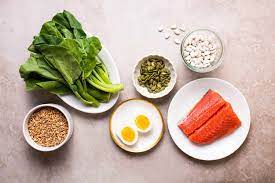
It’s no secret that nutrition plays a critical role in achieving and maintaining optimal fitness levels. Whether you’re a seasoned athlete or just starting on your fitness journey, it’s essential to understand the importance of proper nutrition for your success.
Without proper nutrition, your body simply cannot perform at its best. You may feel sluggish, fatigued, and unable to push yourself as hard as you’d like during workouts. And if you’re not getting enough of the right nutrients, you may even experience injuries or setbacks that can prevent you from achieving your fitness goals altogether.
That’s why it’s important to develop a nutrition plan that works for you. Everyone’s nutritional needs are different, and it’s essential to find a balance of macronutrients (protein, carbohydrates, and fats) and micronutrients (vitamins and minerals) that works best for your body.
In addition to providing your body with the fuel it needs to power through workouts and recover afterward, proper nutrition also has a variety of other benefits for overall health and wellness. From boosting immunity and improving mood to reducing the risk of chronic diseases, the right nutrition plan can help you feel and look your best.
So if you’re serious about your fitness goals, it’s time to start thinking about what you’re putting into your body. With the right nutrition plan in place, you’ll be well on your way to achieving success in every aspect of your fitness journey.
Planning Your Meals and Snacks for the Day
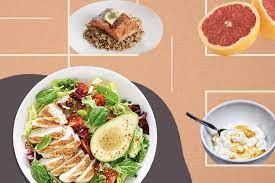
One of the most important things you can do to ensure that you’re fueling your body properly for fitness success is to plan out your meals and snacks for the day ahead of time. This means taking the time to think about what you’re going to eat for breakfast, lunch, and dinner, as well as what snacks you’ll need to sustain your energy levels throughout the day.
Start by thinking about what your day is going to look like. If you have a busy morning ahead, you may need to plan for a more substantial breakfast to help fuel your body through those first few hours. On the other hand, if you have a long day of meetings or sitting at a desk ahead of you, you may want to focus on snacks that will help keep you alert and focused throughout the day.
When planning your meals and snacks, it’s important to consider a balance of macronutrients (protein, carbohydrates, and fat) and micronutrients (vitamins and minerals) to ensure that you’re giving your body everything it needs to perform at its best.
Some tips for planning your meals and snacks for the day include:
- Packing your meals and snacks ahead of time so that you’re not tempted to grab something unhealthy on the go.
- Focusing on whole foods, such as fruits, vegetables, lean protein, and whole grains, to ensure that you’re getting the nutrients you need.
- Balancing your meals and snacks with a combination of protein, carbohydrates, and healthy fats to help keep you satisfied and energized.
- Staying hydrated throughout the day with plenty of water, herbal tea, and other low-sugar beverages.
By taking the time to plan out your meals and snacks for the day, you can ensure that you’re giving your body everything it needs to perform at its best and reach your fitness goals. So grab a pen and paper and start planning today!
Breakfast: Fueling Your Body for the Day Ahead
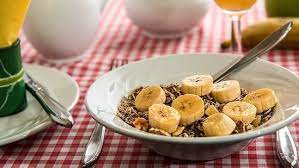
When it comes to fitness, breakfast truly is the most important meal of the day. Eating a nutritious breakfast kick-starts your metabolism and sets you up for success throughout the day. However, not all breakfasts are created equal. It’s important to choose a breakfast that provides you with sustained energy and helps you feel full and satisfied.
A good breakfast should include a balance of protein, healthy fats, and complex carbohydrates. Some excellent breakfast options include oatmeal with nuts and fruit, whole-grain toast with avocado and eggs, or a protein smoothie with spinach and almond butter.
It’s also important to avoid sugary breakfast cereals or pastries, which can lead to a quick sugar rush and subsequent crashes. These types of breakfasts can leave you feeling hungry and sluggish throughout the day.
Additionally, if you’re short on time in the morning, don’t skip breakfast altogether. Instead, try preparing your breakfast the night before. You can make overnight oats or prep a smoothie by freezing pre-cut fruits and vegetables.
In summary, eating a balanced breakfast is key to fueling your body for the day ahead. Make sure to include protein, healthy fats, and complex carbohydrates in your morning meal, and avoid sugary breakfast options. Don’t skip breakfast, even if you’re short on time – prepare your breakfast the night before to ensure you have a healthy start to your day.
Mid-Morning Snacks: Sustaining Your Energy Levels
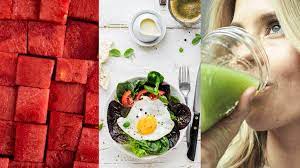
By mid-morning, your body has already burned through the energy from breakfast. It’s important to provide your body with a mid-morning snack to sustain your energy levels and prevent the dreaded mid-day slump.
When choosing a mid-morning snack, aim for a balance of carbohydrates, protein, and healthy fats. A piece of fruit with nut butter, Greek yogurt with berries, or a hard-boiled egg with whole-grain crackers are all great options.
Avoid reaching for sugary snacks or processed foods that can lead to a crash later in the day. These types of snacks may provide a quick burst of energy, but they won’t keep you sustained for long.
Keep your mid-morning snack within 150-200 calories to prevent overeating later in the day. Planning your snacks ahead of time can also help prevent mindless snacking on unhealthy options.
Remember, the key to sustaining your energy levels throughout the day is consistent fueling with healthy, nutrient-dense foods. By making conscious choices and planning ahead, you can set yourself up for success in your fitness journey.
Lunch: Maintaining Your Stamina and Focus
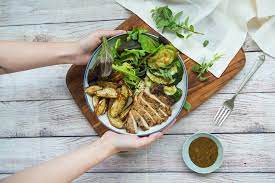
As you reach the mid-point of your day, your body will be craving nutrients to maintain its stamina and focus. That’s why lunch is an essential meal for anyone looking to stay fit and healthy. Whether you are an athlete, a fitness enthusiast, or simply looking to improve your overall health, lunch should be a balanced and nutritious meal.
Aim to include a good source of protein, complex carbohydrates, and healthy fats in your lunch to provide your body with the fuel it needs. Protein is especially important as it will help to repair and build muscle tissue that may have been damaged during your morning workout.
When planning your lunch, choose healthy and colorful foods like lean proteins such as grilled chicken or salmon, complex carbohydrates like brown rice or quinoa, and lots of leafy green vegetables and fruits. Avoid processed foods and sugary snacks that can lead to a mid-afternoon slump.
If you don’t have time to prepare a healthy lunch at home, consider packing a salad or a wrap with lean protein, avocado, and a variety of vegetables and fruits. Many restaurants also offer healthy lunch options, so do some research before heading out to eat.
Remember, lunch should be a satisfying meal that gives you the energy you need to get through the rest of your day. Plan ahead and make healthy choices, and you’ll be on your way to reaching your fitness goals.
Afternoon Snacks: Refueling Your Body
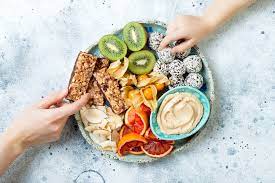
Afternoon snacks are an essential part of your nutrition plan, particularly if you are physically active. The snacks you choose will help you maintain your energy levels and ensure that you stay focused and productive throughout the day.
When it comes to afternoon snacks, focus on foods that provide both carbohydrates and protein. Carbohydrates will give you an energy boost, while protein will help your muscles recover and repair.
Some great options for afternoon snacks include:
- Greek yogurt with berries
- Apple slices with almond butter
- A protein shake with banana and almond milk
- Raw veggies with hummus
- A turkey and cheese wrap
- Hard-boiled eggs with a slice of whole-grain bread
Avoid high-sugar and high-fat snacks like candy bars, chips, and sugary drinks. These will give you a quick energy boost but will cause a sugar crash later in the day, leaving you feeling tired and sluggish.
Instead, choose nutrient-dense foods that will keep you full and energized. You don’t have to spend a lot of time preparing your snacks. Many of the options listed above are easy to prepare and can be eaten on the go.
Remember, your nutrition plan should be flexible and cater to your personal preferences. Choose snacks that you enjoy and that will keep you feeling your best. By fueling your body properly throughout the day, you’ll be better equipped to tackle your fitness goals.
Dinner: Recovering and Repairing Your Muscles
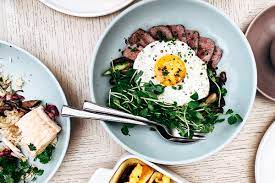
After a long day of physical activity, your body needs the right nutrients to repair and recover your muscles. That’s why dinner is an essential meal for any fitness enthusiast. Your dinner should be protein-rich to help rebuild muscle tissue and support growth.
When planning your dinner, aim for a balance of lean proteins, complex carbohydrates, and healthy fats. Grilled chicken, salmon, turkey, and tofu are all excellent protein sources to consider. For complex carbohydrates, focus on foods like brown rice, quinoa, sweet potatoes, and whole-grain pasta. Don’t forget to include plenty of veggies, like broccoli, spinach, and carrots.
If you’re someone who likes to eat smaller meals throughout the day, consider breaking your dinner into two smaller portions. For example, have grilled chicken and veggies for an early dinner, then a small bowl of quinoa and some nuts or seeds as a second meal later in the evening. This approach will keep you full and help repair your muscles throughout the night.
Another way to support muscle repair and recovery is to eat within an hour of completing your workout. This post-workout meal should be rich in carbohydrates and protein, like a smoothie made with protein powder, frozen fruit, and almond milk. Eating after exercise can help speed up muscle recovery and prevent soreness.
Ultimately, the goal with dinner is to fuel your body and support your fitness goals. By making smart food choices, you can promote muscle recovery and keep your body healthy and strong.
Late Night Snacks: Nourishing Your Body While You Sleep
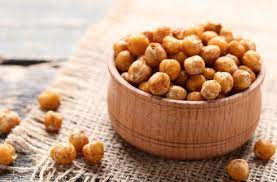
It’s easy to fall into the habit of reaching for a bag of chips or a pint of ice cream as a late-night snack. However, these types of foods can wreak havoc on your body, particularly if you’re trying to achieve fitness success. Instead, focus on incorporating snacks that will nourish your body and help you get the rest you need to recover and repair your muscles.
When it comes to late-night snacking, aim for options that are high in protein and low in sugar. Good choices might include a small bowl of Greek yogurt with fruit, a handful of nuts, or a hard-boiled egg. You might also consider a protein shake, which can provide the amino acids your muscles need to recover and rebuild.
If you’re craving something sweet, opt for a small serving of fruit or a piece of dark chocolate. These options are lower in sugar than many other snack choices, but can still provide a satisfying treat.
It’s also important to pay attention to your body’s hunger signals. Late-night snacking can often be driven by emotions, stress, or boredom, rather than actual hunger. If you find yourself reaching for snacks out of habit, try practicing mindfulness and checking in with your body to determine whether you’re actually hungry.
By nourishing your body with healthy, protein-rich snacks before bed, you can support your fitness goals and set yourself up for a good night’s rest.
Hydration: Staying Properly Hydrated Throughout the Day
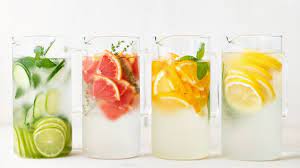
While proper nutrition is essential for fitness success, hydration is equally important. Dehydration can cause fatigue, headaches, muscle cramps, and decreased performance. It’s recommended to drink at least 8-10 cups (64-80 ounces) of water a day, but athletes or those who exercise regularly may need more. Here are some tips for staying properly hydrated throughout the day:
- Start Your Day with Water: Before reaching for coffee or tea in the morning, drink a glass of water to kickstart your hydration.
- Bring a Water Bottle: Keep a refillable water bottle with you throughout the day to make it easier to drink water on the go.
- Add Flavor: If plain water isn’t your thing, add natural flavorings like lemon or mint to enhance the taste.
- Eat Water-Rich Foods: Foods like watermelon, cucumber, and lettuce have high water content, which can contribute to your overall hydration.
- Drink During Exercise: It’s essential to drink water before, during, and after exercise to replace the fluids lost through sweat.
- Watch for Signs of Dehydration: If you feel thirsty, your urine is dark, or you experience symptoms like headache or fatigue, it may be a sign that you’re dehydrated.
Remember, staying properly hydrated is key to achieving fitness success. Make sure to incorporate these hydration strategies into your daily routine to ensure you’re getting enough water throughout the day.
